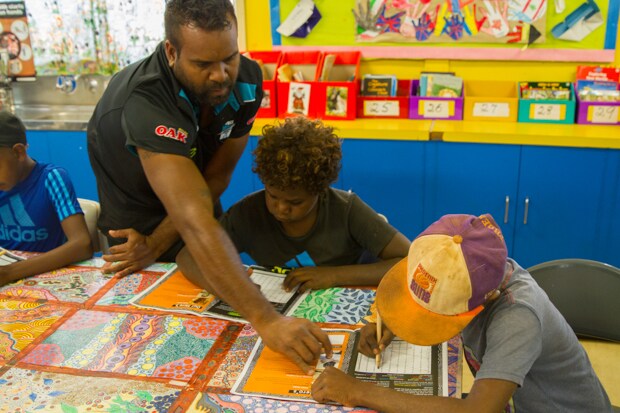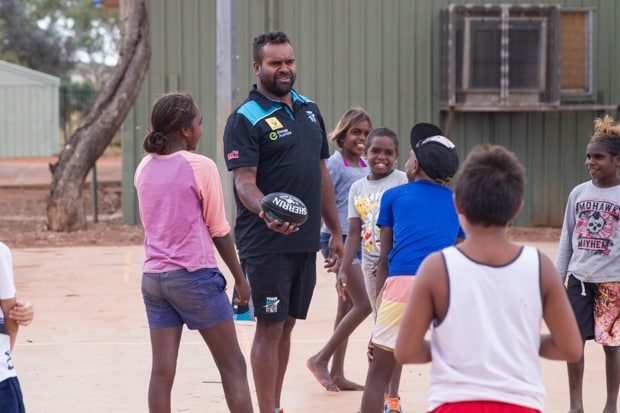BYRON Pickett is a premiership hero for two AFL clubs.
A member of North Melbourne's 1999 premiership team, he would go on to forge a reputation as one of the hardest, toughest players in Australian Football.
Today, his trademark toughness - embodied through bone-crunching tackles, gutsy smothers and the most brutal of bumps seen in the modern elite game - is revered and loved across the country.
To both the Kangaroos, and Port Adelaide - his original club to which he returned as an AFL player to win a second premiership and the Norm Smith Medal in 2004 - he is a favourite son.
He went back to Melbourne after his stint at the Power, and later returned to Alberton be involved in the club's Aboriginal community programs.
While the story of Choppy's AFL career is well known, it very nearly didn't happen.
Playing reserves footy for Port Adelaide in the mid-nineties, Pickett admits he was ready to throw in the towel.
It was his mother who convinced him to see out the rest of the season before being drafted to the Roos in the 1996 National Draft.
portadelaidefc.com.au sat down with Choppy after a day of delivering WillPOWER in the APY Lands to reflect on the importance of role models in the lives of children, particularly those in remote areas.
Matthew Agius: We’re here in the APY Lands for four days, and you’re one of the role models helping to facilitate the WillPOWER program. What does it mean to have the chance to be involved out here this week?
Byron Pickett: It’s awesome. I always look forward to doing stuff with the Power’s Aboriginal programs – not just in the APY Lands, all around SA, up in the Murray Bridge areas, Maralinga and the west coast. We always know what we’re going out to do, and look forward to doing it. It’s great to see the smiles on the young kids’ faces and hopefully we can give them a good message to keep at school and make some goals for when they’re older and achieve them.

MA: How long have you been involved with the Power’s Aboriginal programs?
BP: I’ve been involved for a couple of years – I haven’t done anything for six or so months – and every time Pauly gives me a call and asks me to be involved, I hardly say ‘no’. I love it.
The kids don’t get many sportspeople, whether its footy, basketball or with Taliqua (Clancy) with beach volleyball, it shows them they can achieve great things in life. For me, it’s just seeing them smiling and hopefully by the end of the program we can do enough to help them think about where they want their futures to be.
MA: Many know your Aboriginal heritage, but few know the particulars. What can you tell us about your own culture and background?
BP: I’m from Western Australia, my mum’s people are Badimaya from around Mount Magnet, and my Dad is from the Balardung people in the south-east near Perth. I think it’s really important for Aboriginal people to keep their culture going and learning about it from when they’re young. Hopefully from that we can keep Aboriginal culture going for a very long time. It probably has faded a little bit, but hopefully groups like us can help kids stay in school and give an opportunity to learn skills to make them achieve in later life, but also keep their culture.
MA: You were presented with your own opportunity when you were living in Alberton as a teenager to play AFL footy. Who were your supports and role models at the time to encourage you to the point of being picked up?
BP: I was playing footy for Port Adelaide and as a junior playing for the Maggies, you want to play AFL like your heroes. It’s no different to kids anywhere, I just wanted to play at the highest level. When I got the letter from the Maggies, I was really keen on that. I had friends in Port Lincoln where I was at the time, and family back west, but they all helped me and gave support. My family had a house at Alberton and Mum visited me once every couple of weeks to keep me on the right track.
With that family support it helped me keep going along well. If my Mum wasn’t there, I probably wouldn’t have done what I did in my career.
MA: How did your Mum help you? Did she have a particular influence on your early career or was she just a good support for you?
BP:Two weeks before I got a letter from both Essendon and North Melbourne, I was contemplating going back to Port Lincoln. I’d played a year in Under-19s and the year after I played about five or six Reserves games, and personally felt I should have put more games under my belt.
I felt that nothing was happening and that I wasn’t getting anywhere, but talking to my Mum, she just gave me a pep talk and told me to hang around for the last month of the season, told me to play it out, hang on until the end of the year and see what happens.
I did that, the Bombers and Kangas contacted me through Port.
If my Mum wasn’t there I would’ve probably gone back home and missed out on everything that was to come.

MA: Family is very important isn't it?
BP: I guess it goes to show how important it can be for anyone to have good support around them, even just to put a few things in perspective. I think that’s what we’re hoping to do out here with these programs – give a little bit of good teaching around lifestyle and education so these kids can chase their dreams.


